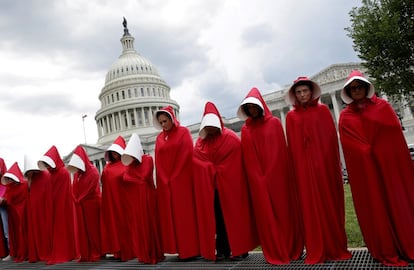How Gilead, the oppressive regime in ‘The Handmaid’s Tale’, could come about
The ultraconservative dictatorship in which the series based on Margaret Atwood’s novel is set is becoming less and less unthinkable
Genesis tells us that during a dispute between Jacob and his uncle Laban, the former fled with his family to the mountains of Transjordan (present-day Jordan). His uncle went in search of him, and a violent clash was looming, but after a divine message and an emotional dialogue, reconciliation came, which was sealed with the relatives piling up stones as a delineation marker. And Laban said, “This heap is a witness between you and me today.” And he named it Galeed.
Galeed, which means “heap of witness” in Hebrew, has given its name — in its English form Gilead — to the oppressive, ultraconservative, and fundamentalist Christian dictatorship in which The Handmaid’s Tale is set. Margaret Atwood’s book was published in 1985, during the Ronald Reagan years; the series premiered in 2017, the first year of Donald Trump’s first term, and has now reached its finale, coincidentally with the Republican back in the White House. Its six seasons have seemed long, because this is a story about suffering, but it has recovered a sense of hope in the final installment.
The series followed the novel only in its first season, and has since developed without the guidance of the original text. In 2019, Atwood published The Testaments, a sequel set a decade and a half later, which must have served the screenwriters well to create an ending that could tie into the upcoming audiovisual production of the latest novel.
We’re not going to spoil the ending of the show here, but rather the beginning. It’s confusing because from the opening scene we’re already immersed in the totalitarian theocracy that has been imposed on most of what used to be the United States, and little by little we’ll piece together how Gilead came to be. We learn that there was an environmental disaster and a fertility crisis, social chaos and false flag attacks, and a coup d’état led by an ultra-right cult called the Sons of Jacob. The president was assassinated and Congress dissolved, human rights vanishing in a flash. The few fertile women became handmaids, or enslaved surrogates, for the commanders, the new ruling caste.

Rape is sanctioned by the new regime, and repression is fierce: mutilations and public executions are commonplace, and the bodies of those hanged are left displayed in the streets. We understand that a smaller part of the U.S. endures under that name, that a resistance called Mayday exists, and that Canada (Atwood’s home country) is a safe haven for asylum seekers, although growing tensions arise between locals and newcomers. It’s not stated in what year all this takes place, but some fans have concluded, piecing together clues scattered throughout the series, that the coup that founded Gilead could have occurred around 2025 (others disagree and place it much earlier, in 2014).
Most of the plot unfolds in what was previously Boston, currently a progressive bastion for those under siege by the Trump administration, as is its most prestigious campus, Harvard. One could imagine an alternative history of Gilead, in which it is the democratically elected power that is taking the reactionary turn. One in which minorities are demonized; in which rights are being abolished; in which people can disappear and reappear in a Salvadoran prison without due process; in which those who have exercised their right to protest are persecuted; in which the military is deployed against the civilian population. A story in which it is the person in charge who fuels the chaos, perhaps to justify the exceptional measures to come.
Sign up for our weekly newsletter to get more English-language news coverage from EL PAÍS USA Edition
Tu suscripción se está usando en otro dispositivo
¿Quieres añadir otro usuario a tu suscripción?
Si continúas leyendo en este dispositivo, no se podrá leer en el otro.
FlechaTu suscripción se está usando en otro dispositivo y solo puedes acceder a EL PAÍS desde un dispositivo a la vez.
Si quieres compartir tu cuenta, cambia tu suscripción a la modalidad Premium, así podrás añadir otro usuario. Cada uno accederá con su propia cuenta de email, lo que os permitirá personalizar vuestra experiencia en EL PAÍS.
¿Tienes una suscripción de empresa? Accede aquí para contratar más cuentas.
En el caso de no saber quién está usando tu cuenta, te recomendamos cambiar tu contraseña aquí.
Si decides continuar compartiendo tu cuenta, este mensaje se mostrará en tu dispositivo y en el de la otra persona que está usando tu cuenta de forma indefinida, afectando a tu experiencia de lectura. Puedes consultar aquí los términos y condiciones de la suscripción digital.









































